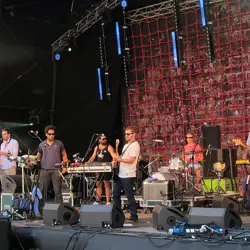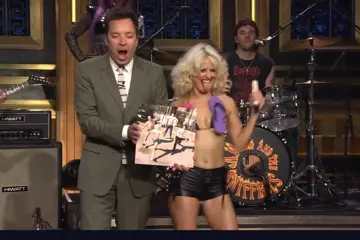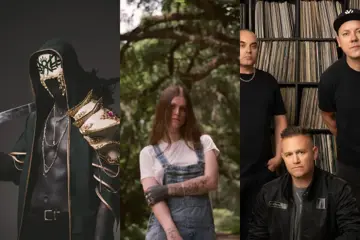 The Black Seeds
The Black SeedsPremier reggae act The Black Seeds spend much of their time gracing festival stages and sweaty bar corners the world over, feeding off the energy of the audience. But everyone needs their downtime. For lead singer Barnaby Weir, it's enjoying the last vestiges of sunshine before the New Zealand winter sets in. “Yeah it's not bad, quite still,” he muses. “We've been able to make the most of it lately. Working from home is the new way forward!”
Work, rest and play often mean the same thing for the workaholic six-piece. Such notions hold extra resonance now as they have fulfilled a life-long dream and acquired their own studio (Production Village in Mt Cook). The new environment has led to much more ownership of their music, thus the creation of fifth studio album Dust & Dirt differs greatly from their previous endeavours. “Having our own space has been instrumental as far as the evolution of our sound,” Weir agrees. “It's been some time since (2008's Solid Ground) – we have released a live album, a remix album, some of the guys have had babies – and we felt it high time that we found our own space, to have a studio that is ours 100 percent, where we can work how we want and jam. We even have mics in the kitchen – it's a relaxed set-up that is the kind of upgrade we all really wanted. We took an extra year out from recording just to find the perfect spot – we're really glad we did.”
Much has been made of Production Village, and Weir asserts that the environment perfectly matches the band's personality whilst creating an atmosphere for them to breathe new life into their craft. “It's certainly a humble little place, and it's nice to have a truly fresh start. We have a beautiful view out the window, and it helps to add that feeling that we are progressing. But what it really means, the beauty of having this place, is that everything is set up. We can play, and jam, and record, at absolutely any time. We can come across a chord, jam it out and press record with relative ease. Before, we had all this pressure to finish an album in a month. This style of recording doesn't allow for reflection – you can't do another take on a song, you can't mull on things, you have to rush it and get things through. That has never really been the optimal way of doing things for us, so we now have the luxury of having more time to record, can do it at the drop of a hat, and we can work on creating a more crispy, raw sound that doesn't sound like it's come from a studio. Our albums can now sound a little more live.”
The Black Seeds have always been revered as a live beast, a band that revels in the electricity and unpredictability of the stage. It's intriguing to think that Weir feels that it has taken over a decade to perfect when putting it all down on record. Having so much extra time to engineer Dust & Dirt, one would expect the production values to spiral in the other direction, hammering away and improving the art until the jagged edges of a live take have been buffed smooth. “Actually, you'd be surprised!” Weir laughs. “In this way we have been able to record all the rhythm section all at once – bass, drums, keyboards – then layer the other pieces over time. We still do overdubs and the like, but the house studio takes away some of that deadness that a normal studio room seems to leave on the record. I think that doing it on our own terms and in our own space has leant life to this record that may have otherwise been missing.”
This level of possession leant itself to the production stage of the album too, as the band looked inward for quality control. “Mike (Fabulous, guitarist) took over the main duties, and it was incredibly exciting,” Weir enthuses. “He has done recordings in the past, so we had faith that he was the right guy for this. Having it 'in band' also means you have more time to think, 'No, that drum mic isn't quite right, it needs to be moved here', and you can play around with that. We experimented so much, with different sounds, mics, rooms, and with so much time on our hands we could just really go for it. No more half-guesses, or crossing the fingers – we could do things until we all agreed that it was the sound we were looking for.”
This level of control could potentially kill one of the most organic factors of The Black Seeds dynamic – improvisation. Weir is quick to deflect such thoughts. “We started out as a jam-oriented band, but we have been together for some time now and have built up this huge collection of songs where we have too many to choose from for any one set. But we always allow the freedom for flow. In fact we have started to morph songs together into a kind of medley, which has presented us with another way of presenting our music. We will always work hard at the structure of a song, but we will never be afraid to move on from that. In fact, I feel we have to. We are part of the songs, and vice versa.”
Such a personal endeavour has helped the band to grow an even tighter bond, one that emanates throughout Dust & Dirt and spills out into their current live shows. “These songs have had more time to evolve, so we feel it represents us in a much more realistic way. It's not strictly reggae – we have never sold ourselves as a strictly reggae band, ever – we have always held a mixture of styles and genres, and we feel now that we can throw it all together and make a statement. It's taken all this time to feel confident that we have an original sound, and I think now we finally do. Looking back over the past years, we've gotten bigger, we've played more shows, we've certainly gotten better – it's evolution, sure, but it's finally clear for us where we are at. It's time to put our flag in the sand.”















